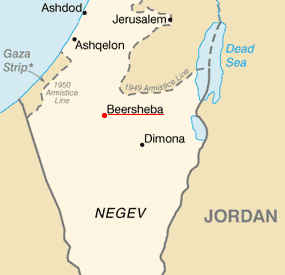When politics took over faith
 |
| Beersheba on the map of Israel (Photo credit: Wikipedia) |
Beersheba (well of the “sevens”) became a location of some importance in Israel’s early history. Hagar (the Egyptian bondwoman who bore Ishmael) was rescued by God at Beersheba (Genesis 21:14-19). Abraham improved the well at Beersheba and settled there, built a grove and “called there on the name of the Lord, the everlasting God” (Genesis21:33). It was at Beersheba that Abraham was told to sacrifice Isaac (Genesis 22:1-4).
Beersheba figured prominently in the life of Israel. Isaac made a covenant with the Philistines there, repaired the well, and lived at Beersheba for many years (Genesis 26:17-33). Historically, Beersheba is best known for the political oaths ceremoniously confirmed there with the secular nations around Israel.
At Beersheba, truth later became equated with tradition. Substituting the wisdom and traditions of man (Mark 7:3-13) or the world’s logic (Colossians 2:8) for truth can be very dangerous.
- God looks forward not backward. Historical places and events are lessons not laws.
- God wants obedience not activity. Past victories are to be praises not patterns.
- God demands truth not compromise. Successful negotiations are directives not doctrines.
“Seek good, and not evil, that ye may live: and so the LORD, the God of hosts, shall be with you, as ye have spoken. Hate the evil, and love the good, and establish judgment in the gate: it may be that the LORD God of hosts will be gracious unto the remnant of Joseph” (Amos 5:14-15).











